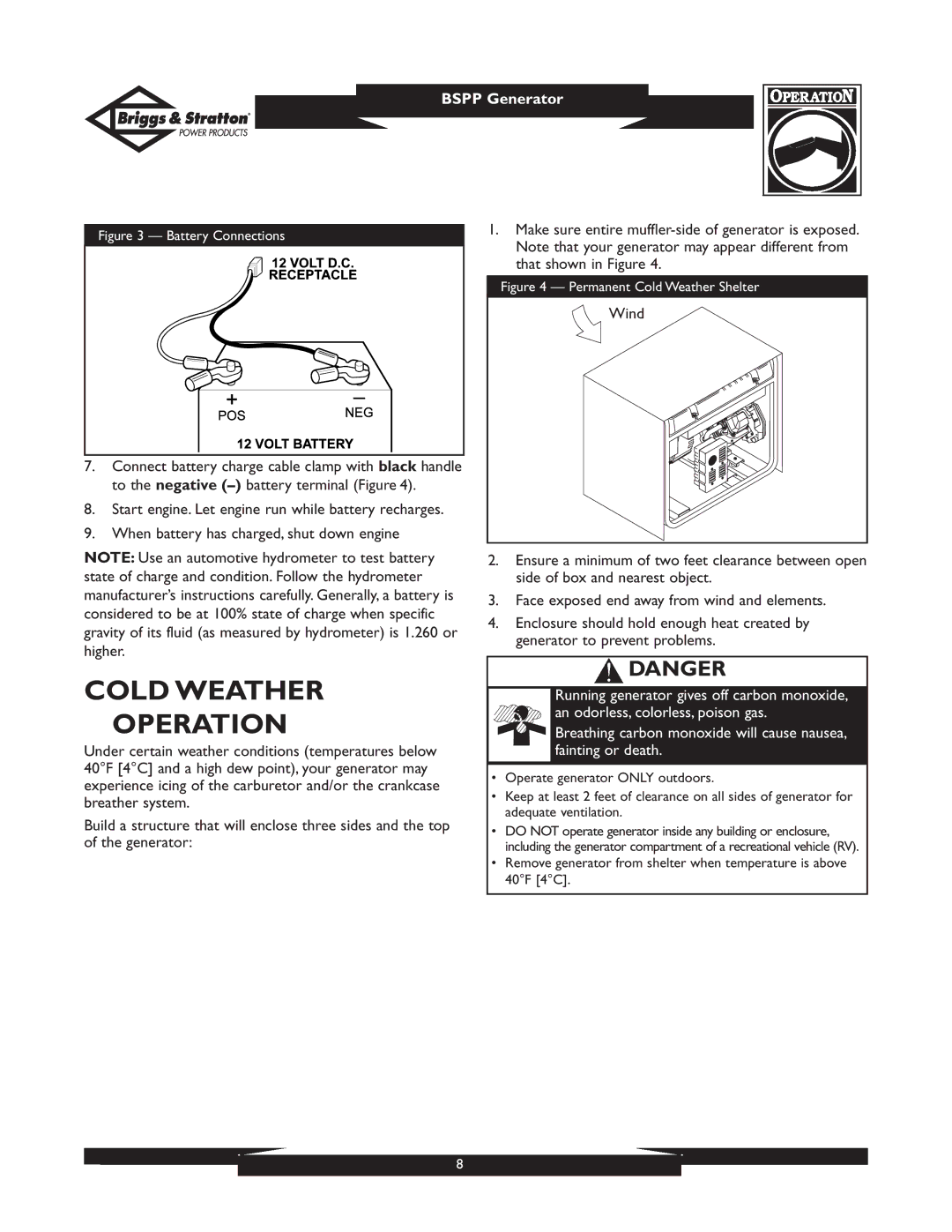PRO4000 01932 PRO6500 01933
Equipment Description
Table of Contents
Safety Rules
When Adding Fuel
When Operating Equipment
When Transporting or Repairing Equipment
When Storing Fuel or Equipment with Fuel in Tank
When Adjusting or Making Repairs to Your Generator
Unintentional sparking can result in fire or electric shock
Assembly
Before Starting the Engine
Remove Generator From Carton
Add Engine Oil and Fuel
Using the Generator
Connecting to a Building’s Electrical System
Operating Generator
System Ground
Connecting Electrical Loads
Charging a Battery
Stopping the Engine
Operating Automatic Idle Control
Cold Weather Operation
Wind
120/240 Volt AC, 20 Amp Locking Receptacle
Receptacles
120/240 Volt AC, 30 Amp, Locking Receptacle
Volt DC, 10 Amp Receptacle
Volt AC, 30 Amp Locking Receptacle
Volt AC, 20 Amp, Duplex Receptacle
Ground Fault Protection
Test Gfci Circuit Breaker
Test your Gfci circuit breaker every month, as follows
During Generator Use
Power Management
Dont Overload Generator
Capacity
Example
General Maintenance Recommendations
Engine Maintenance
Fuel Valve Maintenance
Generator Maintenance
Generator Cleaning
Storage
Generator Storage
Engine Storage
Bspp Generator
Troubleshooting
Problem Cause Correction
OUR Equipment
Symboles de Danger et Moyens
Table DES Matières
Description DE L Équipement
Règles DE Sécurité
Le générateur produit une tension élevée
Lorsque Vous Ajoutez DU Carburant
Lorsque Léquipement Fonctionne
Lorsque Vous Transportez OU Réparez Léquipement
Unintentional peut résulter dans feu ou électrique
Lorsque Vous Réglez OU Réparez Votre Générateur
Assemblage
Avant LE Démarrage DU Moteur
Ajouter de lhuile à moteur et du combustible
Enlever le générateur de la boite
Utilisation DE LA Génératrice
Utilisation DU Générateur
Mise à la terre du système
Branchement au système électrique dun édifice
Branchement des Charges Électriques
Arrêt du Moteur
Fonctionnement du Contrôle Automatique du Ralenti
Recharge d’une Batterie
Exploitation PAR Temps Froid
Fil noir
Prises DE Courant
Prise à Verrouillage de 120/240 Volts c.a., 30 Ampères
Prise à Verrouillage de 120/240 Volts c.a., 20 Ampères
Rallonge a 4 fils 240V 120V Neutre Positif
Prise à Verrouillage de 120 Volts c.a., 30 Ampères
Volts c.a., 20 Ampères Prise de Courant Double
Prise de 10 Ampères, 12 Volts c.c
Rallonge a trois cables
Pendant le fonctionnement de la génératrice
Protection contre les fuites de terre
Mise à lessai du disjoncteur Gfci
NE PAS Surcharger Générateur
Capacité
Gestion de la Consommation
Exemple
Recommandations Générales D’ENTRETIEN
Entretien du Moteur
Entretien du Générateur
Entretien de la Vanne de Combustible
Remisage
Nettoyage de Générateur
Remisage du Générateur
Remisage du Moteur
Remarques
Dépannage
Notre Équpement
Tabla DE Contenidos
Descripción DEL Equipo
Advertencia
Instrucciones DE Seguridad
Peligro
Los generadores producen un voltaje muy poderoso
Cuando Añada Combustible
Cuando Opere EL Equipo
Quemaduras severas pueden ocurrir al hacer contacto
Precaución
Cuando Ajuste O Haga Reparaciones a SU Generador
Montaje
Antes DE Darle Arranque AL Motor
Para Retirar el Generador de la Caja
Agregar Aceite al Motor y Gasolina
USO DEL Generador
Operando EL Generador Precaución
Tierra del Sistema
Conexión al Sistema Eléctrico de un Edificio
Carga de la Bateria
Conexion De Cargas Electricas
Parado Del Motor
Funcionamiento del Control Automático de Marcha en Vacío
Operación Durante UN Clima Frío
Figura 27 Conexiones de la Batería
120/240 Voltios AC, 20 Amperios, Receptáculo de Seguridad
Receptáculos
120/240 Voltios AC, 30 Amp, Receptáculo de Seguridad
Volt AC, 20 Amperios, Receptáculos Dobles
Tomacorrientes de 120 Voltios AC, 30 Amperios
Tomacorrientes de 12 Voltios DC
Mientras se Utiliza el Generador
Protección Contra Fallos de Conexión a Tierra
Compruebe el Disyuntor Gfci
No Sobrecargue Generador
Capacidad
Control de la Energía
Ejemplo
Recomendaciones Generales DE Mantenimiento
Mantenimiento del Motor
Mantenimiento del Generador
Mantenimiento de la Válvula de Combustible
Almacenamiento
Para Limpiar el Generador
Almacenando el Generador
Almacenando el Motor
Problemo Accion Causa
Diagnositicos DE Averías
Garantía Limitada

![]() DANGER
DANGER